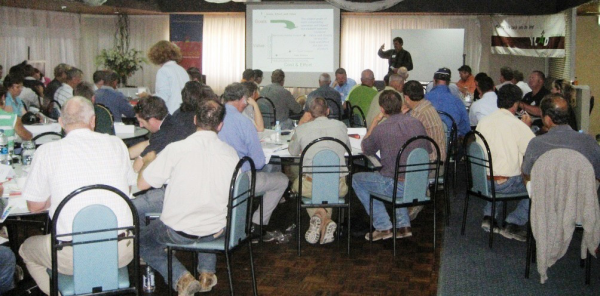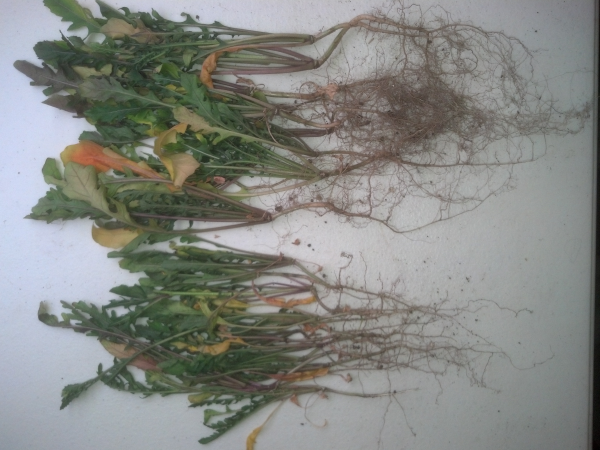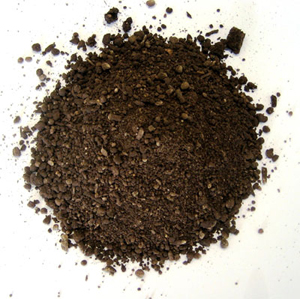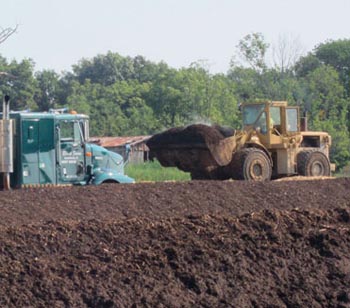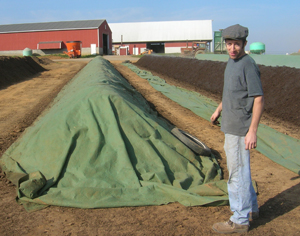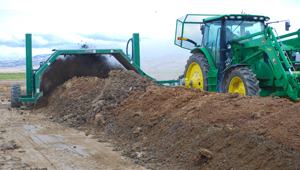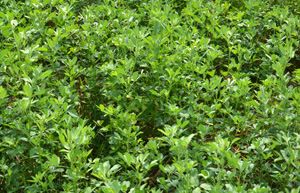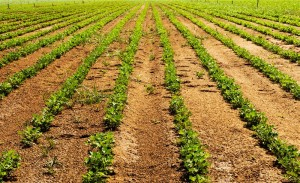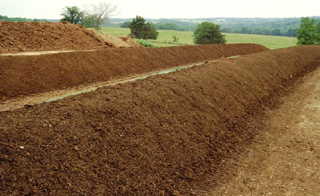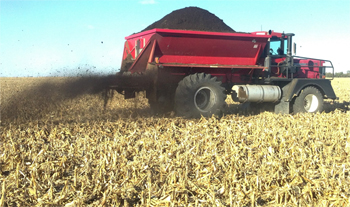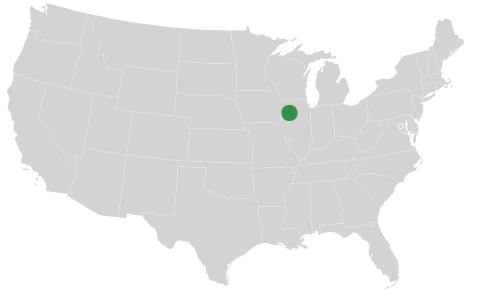Typically one signs up for a workshop to learn how to do something. If you signed-up for the Humus Advantage Composting Workshop April 8-10, 2014 in Tampico, IL, odds are it was because you wanted to learn how to make high quality humus compost. If so, you made a good decision because you will learn the theory and practice of the Aeromaster Composting System, the production methodology developed and refined by Midwest Bio-Systems over the last 20 years. The nuts and bolts of making high quality compost will be covered in PowerPoint as well as in multiple visits to the Midwest Bio-Systems Research and Development compost facility.
Why attend the April 8-10, 2014 Humus Advantage Composting Workshop?
Tags: soil fertility, humus compost, aeromaster humus, composting workshop, humus
We recently did a test growing Arugula using soil with Aeromaster humus added vs. regular soil. Check out the results.
Tags: soil fertility, humus compost, aeromaster humus, nutrient management
20 Years of Soil Fertility, Compost Turners, and Humus Compost
Edwin Blosser shares his vision for Midwest Bio Systems and how his search for “renewable soils” led him to manufacturing compost turners and humus compost.
When Edwin Blosser founded Midwest Bio Systems on February 20th, 1993, he could not have imagined that in 20 years time his company would grow to become a world leader in soil fertility, in manufacturing Compost Turners, ancillary composting equipment as well as in composting technology. In fact, when Blosser, a native of Tampico, Illinois, began exploring sustainable agriculture he never imagined that his quest to “make people healthier,” and help farmers to farm more profitably, would lead him to composting. After a journey of discovery, he founded Midwest with a vision to serve individuals in his local community. Today Midwest has become an international company delivering compost turners to 47 states, 3 US Territories and 25 countries around the world.
Tags: composting equipment, soil fertility, compost turners, humus compost
Yield of Forage Crops Increased by High Quality Feedlot Waste Compost
In the summer of 2012 the Continental U.S. faced its worst drought in recent history. Dry conditions across the Midwest decimated many farmers' grain harvests. Illinois farmer Scott Block was among the victims of the drought and suffered severe crop losses, particularly among his corn and soy crops. But thanks to his on-farm composting program, Block found a way to cut his losses in the aftermath of the drought, and in the case of a late planted oat forage, he discovered the potential of compost to increase the yield of forage crops on his farm.
Tags: soil fertility, fertilizer, on-farm composting, feedlot industry
Humus Compost Tea Raises Relative Feed Value of Alfalfa
Because of its high feed value alfalfa is one of the most important feed crops grown in the U.S. With the price of commercial fertilizer on the rise, some farmers have turned to high-quality compost as an on-farm alternative to boost their alfalfa yields, improve their fertilizing practices, and reduce their dependence on external inputs.
Tags: soil fertility, on-farm composting, humus compost, compost tea
Composted Manure and Dairy Waste Make an Effective Alfalfa Fertlizer
With high levels of digestible calcium, protein, and fiber, Alfalfa is one of the most important and widely-grown feed crops in the U.S., ranking as the third most valuable crop behind only corn and soybeans. Whether they're producing it for their own livestock, or as a cash crop, it is important for farmers to maintain healthy plants and profitable yields. A typical alfalfa planting lasts for several years, making healthy, long-lived plants even more important. An Idaho dairy farmer has found that by composting his manure and dairy waste, he's able to transform it into a rich, balanced fertilizer to enhance his alfalfa crop.
Tags: soil fertility, fertilizer, on-farm composting, dairy industry
Composting Keeps Dairy Farms with Alfalfa Profitable
A dairy farm relying on alfalfa for high quality feed is composting to cut fertilizer costs and seeing dramatically increased alfalfa yields. This is good news for dairy farms feeling the pinch of high fertilizer and feed costs.
When Gary Smith and his son Jason Smith began composting seven years ago, it was to fulfill their farm's need for organic fertilizer. They partnered with a cattle feed lot which provided them with huge volumes of manure and spent bedding as raw materials for their compost. After purchasing an Aeromaster compost turner and completing a training session with Midwest Bio Systems, the Smiths were soon producing high quality compost which boosted the yields on their farm. Neighbors began to take notice.
Today they have a booming business making and selling compost to other farmers, organic and not. Jason Smith has already hauled compost as far as 60 miles for some customers, and the demand is such that he takes orders for compost up to four months in advance. Alfalfa growers are one group of customers who keep coming back for more.
Tags: soil fertility, sustainable farming, fertilizer, on-farm composting, dairy industry
Composting Dairy Waste Eases Restrictive Nutrient Management Program
As farms get larger, and the concern over nitrates in the water supply grows, the regulations surrounding manure applications are becoming more restrictive.
Mark Webb, a dairy farmer in Idaho, runs a 1,800 cow dairy. Like many large animal operations, Mark's dairy is subject to state nutrient regulation that dictates how much manure and dairy waste he is allowed to apply to his fields annually. “We have to report all of our manure that goes onto the field and along with that you have to do soil testing to make sure you stay within the guidelines which are 40 parts per million (ppm) of nitrogen on the field,” he explained.
Because there is a limit to how much manure he can apply to any one field, these regulations are costly for Webb. He had a lot of time and capitol tied up in transporting and spreading manure, in an increasingly large radius surrounding his dairy. But that was before he discovered composting. By creating an on-farm composting program Webb found a solution to efficiently deal with his manure without exceeding the nitrate limits set by his nutrient management plan.
Tags: soil fertility, sustainable farming, dairy industry, nutrient management
Transform Waste to Wealth with Quality Compost
Few in the modern agricultural industry will argue against the necessity of fertilizer to remain competitive, boost profits, or even produce at all. One can spend hours debating the pros and cons of organic versus inorganic, liquid or solid, and various application methods, but ultimately what matters most to the farmer struggling to stay afloat is that the product is affordable and works.
High-quality compost is an organic fertilizer on par with costly synthetic alternatives, providing the full range of micro and macro nutrients needed to produce abundant, robust crops. This is precisely the commodity in demand by farmers across the nation - compost making has the potential to be a very profitable venture, literally transforming waste to wealth.
Tags: composting equipment, soil fertility, fertilizer, humus compost
Dairy Waste Turned into a Good Soil Amendment for Uniform Germination
If you're a dairyman, odds are, you have manure. Until Idaho farmer Mark Webb turned to composting he had too much of it. Webb used to spread his raw manure directly on his fields prior to planting, which “stunted” and “hurt” his crops. “The crops just did not grow as well from the manure that was straight off the corrals,” he said.
Tags: soil fertility, sustainable farming, fertilizer, dairy waste

